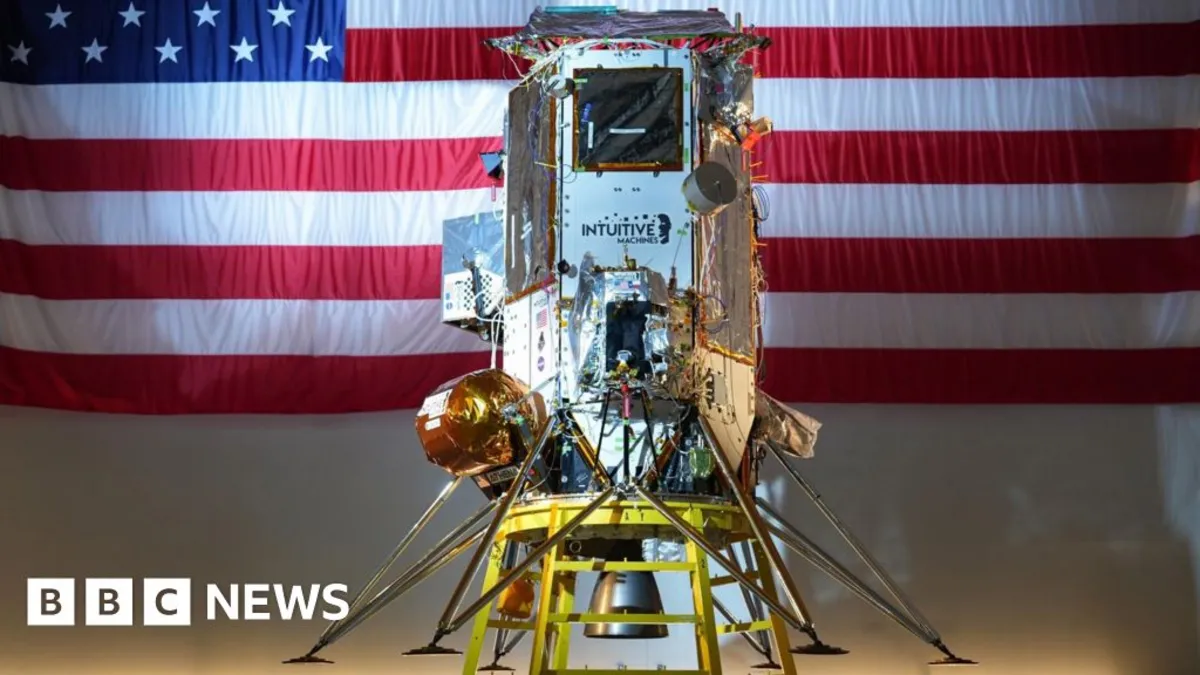
In a groundbreaking vision that seems to leap straight from the pages of a science fiction novel, Stephen Eisele, the president of Lonestar Data Holdings, is confident that his company will one day establish a data centre on the Moon. "By putting the data centre in space, you're really offering unparalleled security," Eisele states, highlighting the potential of lunar facilities for enhanced data protection.
Last month, Lonestar Data Holdings, based in Florida, announced a successful test of a compact data centre, approximately the size of a hardback book. This innovative unit was transported to the Moon aboard the Athena Lunar Lander, which was launched by Intuitive Machines, a prominent US space exploration firm, using a rocket from Elon Musk's SpaceX. This marks a significant step toward realizing the concept of space-based data centres.
Data centres are vast facilities that house numerous computers designed to store and process data for websites, businesses, and government entities. Lonestar contends that establishing these centres on the Moon could provide clients with secure and reliable data processing capabilities while leveraging unlimited solar energy for power. As the demand for data centres surges, the idea of placing them in space is gaining traction.
The increasing reliance on artificial intelligence (AI) has led to a dramatic rise in the volume of data that requires storage and processing globally. According to global management consultants McKinsey, the demand for data centres is expected to grow between 19% and 22% annually by 2030. As a result, new facilities are continuously being constructed, but finding suitable locations on Earth is becoming increasingly challenging.
Data centres require significant amounts of power and water for cooling, and local communities often oppose their construction nearby. The theory behind placing data centres in space—whether in orbit around Earth or on the Moon—is that such facilities would have less environmental impact. With virtually unlimited energy from the sun and no local inhabitants to disturb, these space-based centres could operate more sustainably.
Last summer, a European Commission-funded feasibility study, known as the Ascend report, conducted by Thales Alenia Space, concluded that deploying data centres in space could revolutionize the European digital landscape while being more eco-friendly. The report proposes the construction of a constellation of 13 satellites, measuring a combined 200m by 80m, with a total processing power of around 10 megawatts (MW)—equivalent to a medium-sized, ground-based data centre with approximately 5,000 servers.
Despite the optimistic outlook from companies like Thales Alenia Space, Dr. Domenico Vicinanza, an associate professor of intelligent systems and data science at Anglia Ruskin University, warns of significant hurdles that still need to be overcome. The cost of launching hardware into orbit remains prohibitively high, with each kilogram sent to space costing thousands of dollars. Space-based data centres will require not only the data equipment but also the necessary infrastructure to protect, power, and cool them.
Cooling equipment in space presents unique challenges, as traditional systems are ineffective in a zero-gravity environment. Moreover, space weather can damage electronics, and the growing issue of space debris poses risks to physical hardware. Dr. Vicinanza emphasizes that troubleshooting issues in orbit is complex, and major hardware failures could necessitate costly human missions, extending downtime significantly.
Despite these challenges, companies like Lonestar remain optimistic about the future of space-based data centres. "We wouldn't be doing this if the customers weren't asking us to," says Eisele. Lonestar plans to launch a small data centre into orbit around the Moon by 2027, while other companies, such as Washington state-based Starcloud, aim to expedite their timelines by launching a satellite-based data centre next month, with commercial operations expected to begin by mid-2026.
Eisele believes that space-based facilities could provide enhanced security for governments and businesses, as their data would not need to traverse terrestrial networks. Instead, information could be transmitted directly from space to dedicated ground stations. "It's like having the vaults at the back of the bank," he explains, noting that the Moon's distance from Earth could make unauthorized access significantly more challenging.
Moreover, according to Chris Stott, founder and CEO of Lonestar, space-based data centres could help organizations comply with regulations about data sovereignty, which require data to be stored in its country of origin. Under space law, these facilities would effectively serve as embassies in space, protected by the regulations of the licensing or launching state. Lonestar has already secured customer commitments, including the state of Florida and the Isle of Man government.